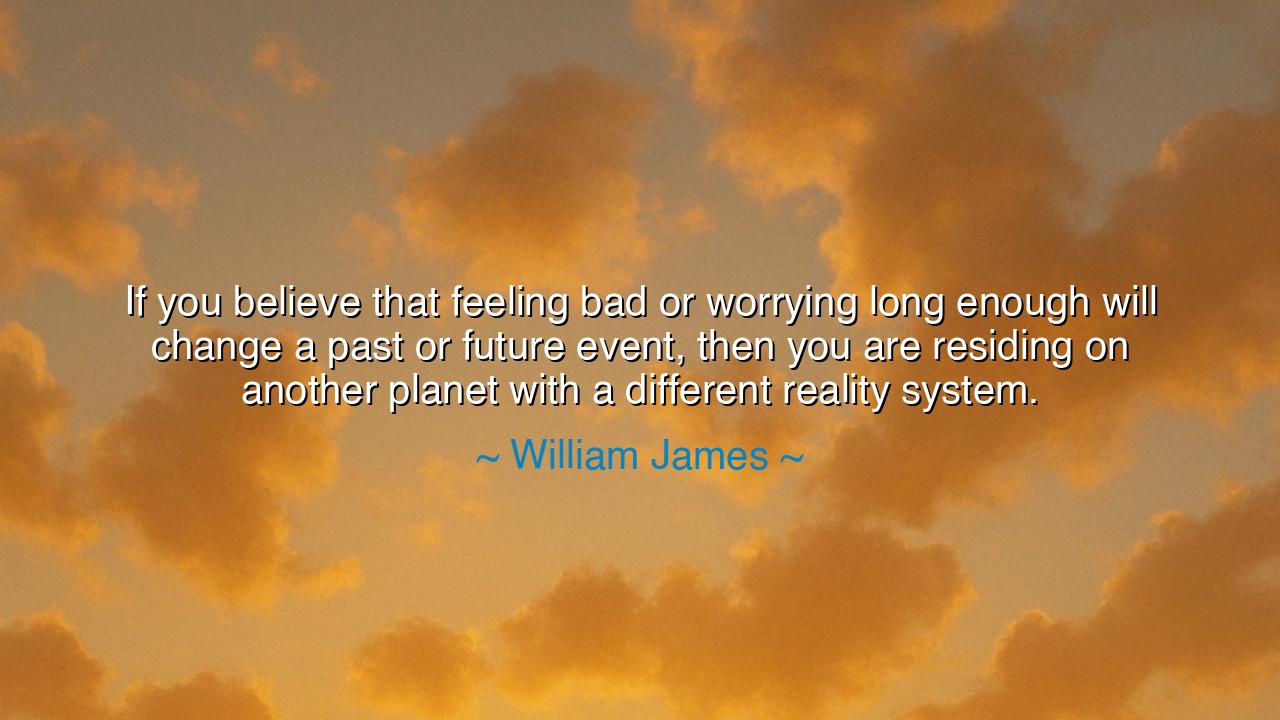
If you believe that feeling bad or worrying long enough will
If you believe that feeling bad or worrying long enough will change a past or future event, then you are residing on another planet with a different reality system.






In the grand flow of existence, where time and circumstances shape our lives, William James delivers a profound truth: “If you believe that feeling bad or worrying long enough will change a past or future event, then you are residing on another planet with a different reality system.” These words strike at the heart of the human condition, reminding us of the futility of worry and regret. To dwell excessively on what has already occurred or to fear what is yet to come is to disconnect from the only time that truly exists—the present. James calls us to live in alignment with the reality of the moment, for the past is gone, and the future is an unknown that cannot be shaped by our fears or anxieties.
The ancient philosophers, particularly the Stoics, understood this deeply. Epictetus, a Stoic philosopher, taught that external events are beyond our control, and the only thing we can govern is our reaction to them. He advised that we should not waste our energy on worry or regret, for these are futile emotions that only weaken the mind. Like William James, the Stoics recognized that feeling bad about the past or worrying about the future can never alter reality. Instead, they taught that true strength lies in accepting life as it is, embracing the present with peace and clarity. The past is a shadow that cannot be touched, and the future is but an uncertain horizon.
In the ancient story of King Midas, we find an example of the dangerous pursuit of changing the inevitable. Midas, who was granted the wish to turn everything he touched into gold, soon discovered that this gift was a curse, for his food, his family, and even his beloved daughter turned to gold. In his regret, he sought a way to undo his wish, but no amount of sorrow or worry could change what had already been done. Just as Midas could not reverse the past, so too are we powerless to undo the events we regret or to worry away the future. James's wisdom resonates with this ancient tale: emotional reaction cannot rewrite the script of life.
Socrates, too, echoed this sentiment in his teachings. He believed that true wisdom came from accepting the present and using our energy to focus on what can be controlled—our thoughts and actions in the now. The past is behind us, and the future is shaped not by our worries but by the actions we take today. The philosopher taught that the mind is our greatest tool, and dwelling in regret or anxiety only clouds our ability to act with clarity. James’s quote is a modern echo of this timeless lesson: we must free ourselves from the illusion that our emotional turmoil can change what has passed or what is to come.
In the life of Helen Keller, we see a powerful example of living in the present, despite the overwhelming challenges of her past. Deaf and blind, Keller faced a world of isolation and difficulty. Yet, she did not allow herself to be paralyzed by regret over the life she could not experience or by fear of the future. Instead, she focused on what she could do in the present—she learned, she wrote, and she became an advocate for others. Keller’s life stands as a testament to the power of action in the face of adversity, and it teaches us that, like William James suggests, feeling bad about what is lost or worrying about what is to come only hinders our ability to act in the present.
The lesson here is one of profound freedom. William James offers us a path to peace through acceptance. To spend our lives burdened by regret for the past or paralyzed by anxiety about the future is to give away our power over the present. We must learn to release these distractions, for they rob us of the energy and clarity needed to make a difference in our lives and the world around us. By acknowledging that we cannot control the past or predict the future, we free ourselves to live fully in the now, where true change and growth occur.
In our own lives, we are called to focus our attention on the present moment, to release the emotional weight of past mistakes and the heavy burdens of future fears. Just as the Stoics and Socrates advised, we must take responsibility for what we can control—our thoughts, actions, and attitudes—while accepting the rest with grace and wisdom. Let us not waste our time and energy wishing for what cannot be undone or fearing what has not yet come to pass. Instead, let us embrace each moment with the clarity and purpose that James and the ancients spoke of, knowing that the only true reality we can shape is the one we live in today.






AAdministratorAdministrator
Welcome, honored guests. Please leave a comment, we will respond soon